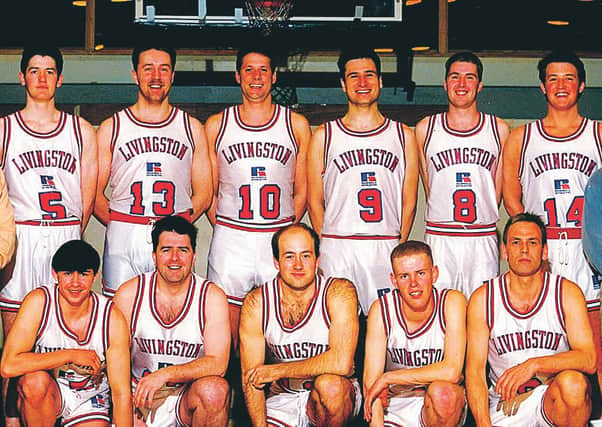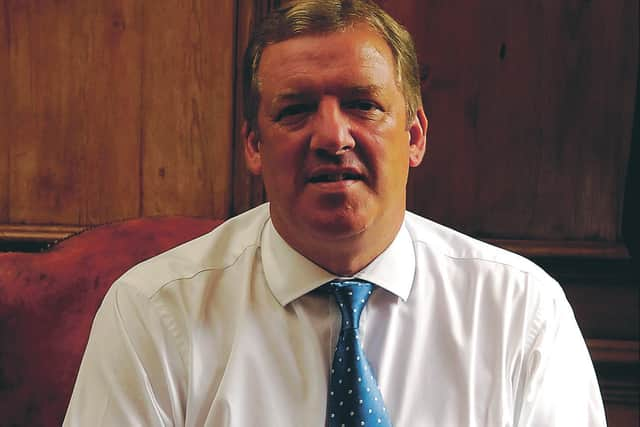David Murray’s commitment to basketball propelled Livingston side to the top


As Michael Jordan won Chicago its sixth championship in 1998, Scotland’s own Bulls’ dynasty were celebrating. The Midlothian Bulls had won ten straight titles.
It wasn’t easy, and actual basketball games were just part of the challenge. The team endured rebrands, withdrawn funding, arena changes and team mergers. The biggest threat though, one that looms over all Scottish basketball, is that of total obscurity.
Advertisement
Hide AdAdvertisement
Hide AdLivingston’s success story started 20 years earlier in 1977. David Murray, who’d later buy Rangers, sponsored and named the team after his company, Murray International Metals.


He committed to basketball, acquiring the best players and coaches available. “He was focused on getting the best results,” said Alton Byrd, who played for MIM from 1983 to 87. “Together we built the best basketball organisation in all of the United Kingdom.”
They quickly proved it, winning tournaments all over the UK and Europe. They defeated the Soviet Union Olympic champions at London’s World Invitational Club Basketball Tournament. And won the inaugural British Basketball League trophy in 1988.
Scottish basketball peaked during this era, said Sandy Sutherland, a journalist who covered the team. “You came out of the arena and thought ‘wow, what a game.’ When you’re indoors with a big crowd, the intensity is electric.”
In 1988, Murray, right, purchased Rangers FC, acquiring another basketball club in the deal. He rebranded them as Rangers, and they, alongside Livingston, played in the BBL’s second season, placing first and second respectively.
Despite the success, things went south for the basketball side as Murray withdrew his support. Ian Gordon, Livingston’s head coach at the time, said Murray faced complications with the league that contributed to his withdrawal.
“He wanted to strengthen Scottish basketball so he didn’t have to rely on the BBL entirely,” Gordon said. “He offered to fund two foreign players for each team in the Scottish league, and he put that to the association and it was declined.”
The team had also rebranded as MIM Livingston, so Murray had less exposure, and Gordon believed “that contributed to him calling it a day”.
Advertisement
Hide AdAdvertisement
Hide AdThey left the British league, the American players went home, and they rebranded again as the Livingston Bulls. A lot had changed for the team, but “we just got on with it,” said Alan Lamb, who joined in 1987. “Nobody was bothered.”
They continued winning as a mostly Scottish unit, led by Iain “The Bull” MacLean. “He sort of took the team on his shoulders,” Lamb said. “He trained hard all the time,” and “you were always trying to get up to that standard.”
No one felt the Bulls’ force more than their opponents. Bobby Cosgrove joined the national league in 1994 with Strathkelvin. “I knew they were good,” he said, “but then I played against them a couple of times and realised it.”
Cosgrove joined the Scotland squad a year later, getting a chance to play on the same side as some Bulls players, “and that was a real eye opener.”
In 1996, the Bulls asked Cosgrove to join them.
“Sometimes the hardest games of the week were in training,” he explained. There were even fights during practice; the intensity was that high. But at the end of the session they shook hands. They went for a pint, united. The team merged with Dalkeith in 1997 to become the Midlothian Bulls, and despite more changes won their tenth straight Scottish league title in 1998.
The cup was still to play for though, and it was the Bulls versus Glasgow in the final. It was not going well. “We were 16 nothing down,” laughed Cosgrove. “Nothing’s going in. They’re hitting everything. But I’d been playing a year and gotten that confidence a wee bit, that calmness.”
The Bulls started scoring and pulled it back, bit by bit. “It was just that attitude,” Cosgrove said.
“When things got tight at the end of a game, we drew together,” and the Bulls took home the trophy.
Advertisement
Hide AdAdvertisement
Hide AdIt would be their last big win. A new professional club had come to Scotland, the Edinburgh (now Glasgow) Rocks, and MacLean left Midlothian to join them.
“It was like Michael Jordan leaving the Bulls,” Cosgrove said. In close matches, “he was always the one who’d take the shots”.
Other players left too, but the Bulls still fought hard, and won close games and beat top teams, but they didn’t win the league again.
It didn’t matter. “We weren’t all sitting there crying,” Cosgrove said. “If guys were injured you didn’t sit and moan, you just got on with your job.”
With an ageing staff though, retirement was just around the corner. Three years after the league win, the Bulls walked off the court for the final time.
“It just fizzled out,” said Lamb. There weren’t any young players coming through. The team had grown older and had other commitments. “It wasn’t anybody’s decision. It just kind of happened.”
Three years after winning the national trophy; three years after a decade long winning streak; it took three years for a 20-year dynasty to fall apart.
A message from the Editor:
Thank you for reading this story on our website. While I have your attention, I also have an important request to make of you.
Advertisement
Hide AdAdvertisement
Hide AdWith the coronavirus lockdown having a major impact on many of our advertisers - and consequently the revenue we receive - we are more reliant than ever on you taking out a digital subscription.
Subscribe to scotsman.com and enjoy unlimited access to Scottish news and information online and on our app. With a digital subscription, you can read more than 5 articles, see fewer ads, enjoy faster load times, and get access to exclusive newsletters and content. Visit https://www.scotsman.com/subscriptions now to sign up.
Our journalism costs money and we rely on advertising, print and digital revenues to help to support them. By supporting us, we are able to support you in providing trusted, fact-checked content for this website.
Joy Yates
Editorial Director
Comments
Want to join the conversation? Please or to comment on this article.